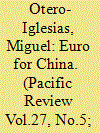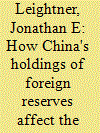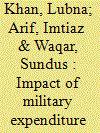|
|
|
Sort Order |
|
|
|
Items / Page
|
|
|
|
|
|
|
| Srl | Item |
| 1 |
ID:
135075


|
|
|
|
|
| Summary/Abstract |
The aim of this paper is to analyze China's strategy in relation to the euro. The first section summarizes China's active support to the single currency since its creation up to the first phase of the current Eurozone debt crisis. It shows how China has used a two-pronged approach. It has developed a public campaign in favor of the euro, especially when the market sentiment has been bearish on the single currency, and it has continued to be an active player in the European sovereign debt markets. The second part explains why China has been so supportive. Beijing wants to move away from dollar hegemony and thus it favors a tripolar monetary system based on the US dollar, the euro and the Chinese renminbi (RMB). With this aim, and despite the crisis, China has continued to diversify its foreign reserves into the euro making it by now ‘too important to fail’, not only because China holds roughly $1 trillion in euro-denominated assets, but also because for China the Eurozone is a crucial market and an important strategic counterweight to US dominance in world affairs. Finally, the third part focuses on how by the end of 2011 China switches to a more cautious approach due to the difficulty involved in rescuing the Eurozone. Domestic pressures, public outcry in Europe against being saved by China, the unwillingness of the European leaders to enter into strategic bargaining and Germany's strategy to use sovereign bond spreads as a market mechanism to create ‘more Europe’ have convinced policy-makers in Beijing to keep a lower profile while making sure the value of the euro remains stable.
|
|
|
|
|
|
|
|
|
|
|
|
|
|
|
|
| 2 |
ID:
096228


|
|
|
|
|
| Publication |
2010.
|
| Summary/Abstract |
By January 2009, China held almost US$2tn in foreign reserves. The present paper estimates the marginal effect of China changing its holdings of foreign reserves on the value of the US dollar in Europe and Asia. Because using traditional techniques to find this estimate would be inappropriate due to severe problems resulting from omitted variables, the present paper uses a new approach, bidirectional-reiterative truncated projected least squares, that has been proven to minimize problems associated with omitted variables. It is found that if China would sell 1 percent of its foreign reserves, then the value of the US dollar would fall by 0.44 percent. With such a large effect, China has an incentive to either not sell any of its US dollar reserves or sell all of its US dollar reserves.
|
|
|
|
|
|
|
|
|
|
|
|
|
|
|
|
| 3 |
ID:
179959


|
|
|
|
|
| Summary/Abstract |
This study aims to empirically test the effects of military expenditure on external debt of 35 arms importing countries by using the annual panel data from the year 1995 to 2016. The panel was divided into two income classes (upper-middle and lower-middle), and the basic sample was also divided into five different regions (Middle-East and North Africa, South and East Asia, Latin America, Europe and Central Asia, and Sub-Saharan Africa) to achieve further robustness in the study. The empirical results of pooled mean group estimators suggest that military expenditure generally increases the external debt burden in the studied countries. More specifically, it was noted that military expenditure decreases external debt in Europe and Central Asia. Moreover, it was found that the interaction term of military expenditure and growth rate is positive and significant in all of the sub-samples, except upper-middle class, the Middle East and North Africa, and Latin American regions. Thus, it may be concluded that military expenditure often increases external debt burden in countries where the debt management system is weak. Countries with weaker debt management systems need to devise economic policies that curtail their military expenditure, reduce their external debt and improve their economic condition.
|
|
|
|
|
|
|
|
|
|
|
|
|
|
|
|
| 4 |
ID:
117921


|
|
|
|
|
| Publication |
2013.
|
| Summary/Abstract |
International commentators seem to have a consensus view that the Chinese yuan is substantially undervalued and the Chinese monetary authority must take speedy actions to redress the currency misalignment by rapid nominal revaluation. This paper argues for a gradualist but comprehensive strategy for adjusting the renminbi's exchange rate. Taking into consideration the facts that the yuan's undervaluation is caused by an array of domestic and international factors and that the Chinese central bank cannot effectively invest its growing holdings of foreign reserves, we develop a framework to provide a theoretical underpinning for the optimal strategy for the renminbi's gradual revaluation. With this strategy, the renminbi undervaluation problem is gradually redressed through a combination of nominal appreciation and higher inflation plus some other structural and macroeconomic policies. This strategy can also allow absorption of external imbalances, hence strengthening the foundation of China's long-term growth.
|
|
|
|
|
|
|
|
|
|
|
|
|
|
|
|
| 5 |
ID:
178432


|
|
|
|
|
| Summary/Abstract |
The conventional mandates of the central banks on meeting stability objectives and maintaining a growth-maximizing inflation rate have come under some criticism since the global financial crises. Maintaining adequate foreign reserves is seen as a viable solution to foreign exchange liquidity needs during crisis periods. Since the end of 2011, many Asian economies, including China and Japan, led from the forefront in central bank-led reserves build-up. However, reserves build-up remains challenging and sensitive for small open economies. Such policies help create ‘risk-neutral’ buffers for monetary and fiscal authorities to absorb transitory current account shocks and foreign exchange stress to smoothen the balance of payments. This study is motivated by the importance of identifying the inflation–foreign reserves nexus that may affect inflation in a manner counterproductive to the central bank mandate of maintaining price stability. It probes the debate of the sustainability of reserves build-up in the long and the short term. The outcome of the study poses several vital questions for fiscal and monetary policymakers concerning their respective mandates. The reserves–inflation nexus and its magnitude is determined using monthly data spanning two decades, through engaging an autoregressive distributed lag (ARDL) model and relevant bounds-testing techniques proposed by Pesaran et al. The vector autoregression (VAR), error correction and Johansen cointegration methods supplement the robustness checks. Exchange rate is introduced to enrich the discussion on the reserves–inflation nexus and shows a cointegration relationship in the long run. The study provides an insight into the influence of exchange rate on reserves and inflation. The variance decomposition shows the presence of a lukewarm response from foreign reserves and exchange rate on inflation. Policymakers concerned with inflationary expectations in the medium-to-long term need to consider these signals, as reserves build-up is one of the important policy-driven objectives for a number of economies.
|
|
|
|
|
|
|
|
|
|
|
|
|
|
|
|
| 6 |
ID:
124977


|
|
|
|
|
| Publication |
2013.
|
| Summary/Abstract |
In this paper, we study strategic asset allocation for China's foreign reserves using a risk-based approach. Four aspects of the risk management are investigated: an investment universe, dependence structure, allocation strategies under risk minimization and trade-off between risks and returns. A regime-switching copula model is developed to investigate the dynamic dependence between assets. One regime emphasizes a short-term safe asset and the other regime emphasizes a long-term safe asset. The optimal allocation is derived following two strategies: risk minimization and trade-off between risks and returns in utility maximization with disappointment avoidance. If the central bank focuses solely on risk minimization, the asymmetries in the asset return dependence encourage the flight to safety. However, if higher risks are allowed in exchange for higher returns, even the exchange is very conservative, and the asymmetries would discourage the flight to safety. Therefore, we suggest that China should mitigate its flight to safety after 2008 and increase holdings of short-term bank deposits, long-term treasury bonds and euro bonds.
|
|
|
|
|
|
|
|
|
|
|
|
|
|
|
|
|
|
|
|
|